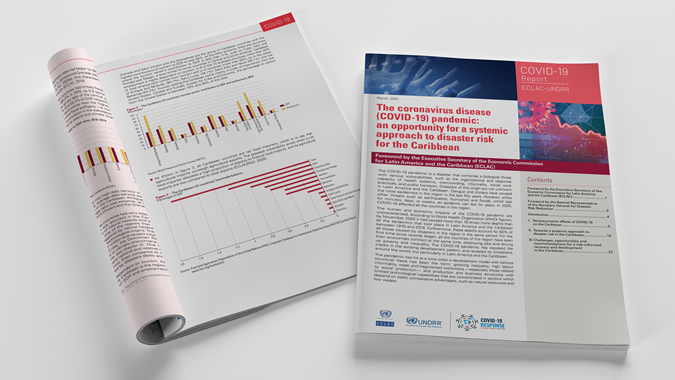New Report Analyzes the Socioeconomic Repercussions of COVID-19 in the Caribbean and the Urgency of Moving Towards a Systemic Approach to Disaster Risk
Work area(s)
In a special joint report, ECLAC and UNDRR address challenges, opportunities and recommendations for moving towards a risk-informed recovery and development model in the Caribbean.

The large-scale and long-lasting effects of coronavirus disease (COVID-19), combined with the possible impact of other hazards and recent events, threaten to damage or destroy vital infrastructure and the life-support systems of large parts of societies and economies. That is why it is urgently necessary to move towards a systemic approach to disaster risk, primarily in the Caribbean, which is highly vulnerable to the effects of climate change, with economies dependent on foreign tourism and heavy debt burdens. So indicates a document released today, which was produced by the Economic Commission for Latin America and the Caribbean (ECLAC) and the United Nations Office for Disaster Risk Reduction (UNDRR).
The report entitled The coronavirus disease (COVID-19) pandemic: an opportunity for a systemic approach to disaster risk for the Caribbean emphasizes that disaster risk is systemic and generates complex interactions between human, social, political and economic systems on the one hand, and natural systems on the other. The COVID-19 pandemic demonstrates the extent to which a single hazard has the potential to trigger a series of cascading effects, impacting the life-support systems of societies and economies worldwide.
“This crisis underscores the need for disaster risk management to be incorporated into national planning, in order to guarantee a comprehensive response to disasters. At the global and regional levels, it is crucial that those of us who work in international organizations seek ways to promote and foster a new development model and a global framework that would enable us to provide a coordinated and adequate response to the next pandemic,” Alicia Bárcena, ECLAC’s Executive Secretary, affirmed.
Meanwhile, Mami Mizutori, Special Representative of the Secretary-General for Disaster Risk Reduction, indicated that “now is the time for multi-stakeholder dialogue and action to understand and manage systemic risk. Progress towards risk-informed sustainable development will only be accelerated by incorporating systems-based approaches into the design of policies and investments across all sectors and regions, and at all levels.”
The document indicates that the duration of COVID-19 increases the likelihood that the risk of disasters originating from other threats occurs simultaneously, or that post-disaster reconstruction be delayed. The effects and impacts of the Eta and Iota hurricanes in Honduras, Guatemala and Nicaragua – combined with those of COVID-19 – are proof of this, as is the delay prompted by the pandemic in reconstruction efforts after the disaster caused by Hurricane Dorian in the Bahamas.
It specifies that the selection of the Caribbean to exemplify the potential effects of systemic disaster risk is no coincidence. “This region was chosen because it is highly vulnerable to hydrometeorological or extreme climate phenomena, it has more than 90% of the population living in coastal areas and its economies are dependent on foreign tourism and are highly indebted,” the report emphasizes, adding that the economic and social effects of COVID-19 have been devastating for the Caribbean and will last for several years.
According to the report, the pandemic has brought to light the cracks in current development models and highlighted their limitations, both globally as well as in the case of Latin America and the Caribbean in particular. Until recently, orthodox economists agreed that maintaining fiscal balance, limiting State intervention in the economy as much as possible, and fostering trade and financial openness would suffice to generate growth and redistribution. There was unfettered confidence that liberalizing markets for goods, services and capital would be the right formula for ensuring prosperity. This ideological framework sustained a system of international governance whose main objective was to minimize national barriers to trade and investment.
“It is now recognized that the State must play a much more important role, regulating and coordinating markets and promoting social protection and equality. Building back better in the Caribbean must be rebuilding with equality and resilience, for instance by implementing active fiscal policies with a gender approach to mitigate the disproportionate effects of the COVID-19 pandemic on women and by forging political compacts at all levels based on feminist principles of redistribution of power, time, work and resources. The aim is to move towards a development model that has equality and environmental sustainability at its center. In the Caribbean, which is threatened by multiple hazards, a systemic approach is required to reduce disaster risk and vulnerabilities,” the document states.
The report concludes that the complexity of these situations demands an approach that transcends traditional and compartmentalized methods of disaster risk reduction. It asserts that, in order for efforts to reduce disaster impact to be effective, it is necessary to abandon the simplistic model that ignores the systemic characteristics of extreme phenomena. This applies to institutional arrangements for risk governance, community organizations, research initiatives and policymaking. Thus, development planning can play a fundamental role, helping to incorporate a systemic approach into risk governance.
Related content
Related link(s)
Country(ies)
- Latin America and the Caribbean
Contact
Public Information Unit
- prensa@cepal.org
- (56 2) 2210 2040